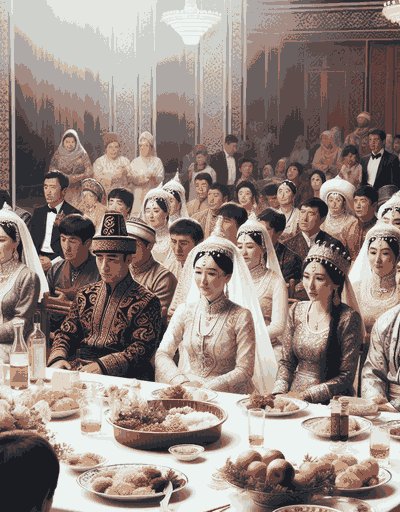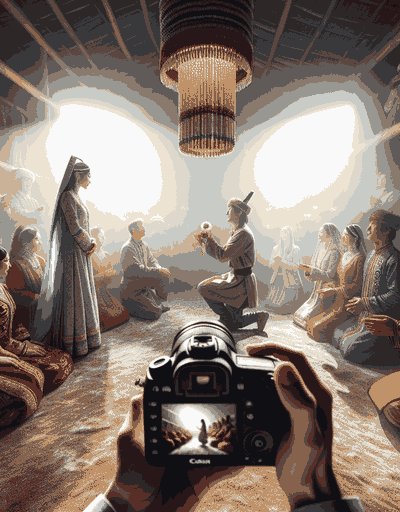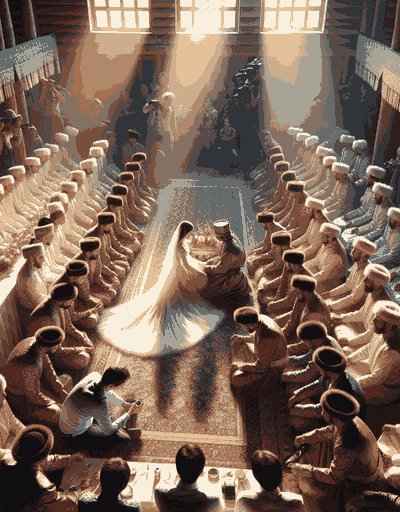Kazakhstan Wedding Traditions
Kazakhstan wedding traditions are elaborate multi-day celebrations combining ancient nomadic customs, Islamic ceremonies, and modern practices that typically involve 200-500 guests and cost $15,000-50,000 USD. These traditions encompass pre-wedding negotiations lasting 3-6 months, ceremonial bride unveiling (betasharbet-ah-SHAR), religious marriage (Neke Qiyuneh-KEH kee-YOO), and festive receptions (toitoy), creating celebrations that honor Kazakhstan’s rich cultural heritage while embracing contemporary influences.

Overview of Traditional Kazakh Wedding Process

The complete Kazakh wedding journey includes:
- 6-12 months before: Initial matchmaking discussions (Kuda Tusukoo-DAH too-SOO)
- 3-6 months before: Formal engagement ceremony (Syrga Salusir-GAH sah-LOO)
- 1-3 months before: Bride price negotiations (Kalymkah-LIM: $5,000-30,000 USD)
- 2-4 weeks before: Dowry preparation (Jasauzhah-SAU: $10,000-50,000 worth)
- Wedding week: Pre-wedding farewell celebrations (Kyz Uzatukiz oo-ZAH-too)
- Wedding day: Civil registration, betasharbet-ah-SHAR unveiling, religious ceremony
- Post-wedding: Family visits and new home establishment
Pre-Wedding Traditions and Ceremonies

What is Kuda Tusu (Matchmaking)?
Kuda Tusukoo-DAH too-SOO is the formal matchmaking process where the groom’s family visits the bride’s family with gifts to request marriage permission, typically occurring 6-12 months before the wedding. This centuries-old tradition involves the groom’s father and 5-10 respected male relatives bringing gifts worth $500-2,000 USD to begin negotiations.
The matchmaking process includes:
- Initial visit: Groom’s family brings traditional gifts (cognac, sweets, fabrics)
- Formal request: Elder spokesman presents marriage proposal
- Family discussion: Both families evaluate compatibility
- Agreement celebration: Shared meal if proposal accepted
Regional variations in matchmaking:
- Southern Kazakhstan: More elaborate gift presentations, stricter protocols
- Northern regions: Simplified ceremonies, smaller delegations
- Urban areas: Often symbolic after couple already engaged
Modern practice sees 75% of urban Kazakh couples choosing their own partners, with matchmaking becoming a formality that honors tradition while respecting young people’s autonomy.
Kalym (Bride Price) Requirements
Kalymkah-LIM is the traditional bride price paid by the groom’s family to the bride’s family, historically consisting of livestock but now typically ranging from $5,000-30,000 USD in cash and gifts. This tradition, dating back over 1,000 years, demonstrates the groom’s family’s financial stability and commitment.
Traditional kalym components:
- Historical practice: 47-77 head of livestock for average families
- Wealthy families: Up to 1,000 horses in extreme cases
- Modern cash equivalent: $100-500 per head of symbolic livestock
- Additional gifts: Jewelry ($1,000-5,000), clothing sets, household items
Current kalym negotiations involve:
- Base amount: Determined by families’ social status
- Regional averages: Southern regions ($15,000-30,000), Northern cities ($5,000-15,000)
- Payment schedule: Often paid in installments over 6-12 months
- Symbolic elements: Number often includes “7” for cultural significance
Syrga Salu (Engagement Ceremony)
Syrga Salusir-GAH sah-LOO is the formal engagement ceremony where the groom’s family presents the bride with earrings (syrga) and other jewelry, officially announcing the engagement 3-6 months before the wedding. This celebration typically involves 50-100 guests and costs $2,000-5,000.
Engagement ceremony elements:
- Traditional earrings: Gold syrga worth $500-2,000
- Additional jewelry: Rings, bracelets, necklaces ($1,000-3,000 total)
- Ceremonial clothing: 2-3 traditional outfits for bride
- Feast expenses: $1,500-3,000 for guest hospitality
Modern adaptations include combining Western-style proposals with traditional Syrga Salu, creating hybrid ceremonies that satisfy both romantic and cultural expectations.
Jasau (Dowry Preparation)
Jasauzhah-SAU is the comprehensive dowry prepared by the bride’s family, traditionally including a complete household setup worth $10,000-50,000 in contemporary Kazakhstan. This practice ensures the bride contributes substantial assets to the new household.
Traditional dowry contents:
- Furniture: Bedroom set, living room furnishings ($5,000-15,000)
- Textiles: 20-30 handmade carpets and wall hangings ($3,000-10,000)
- Kitchen items: Complete cookware and dining sets ($1,000-3,000)
- Clothing: 40-50 outfits including traditional wear ($2,000-5,000)
- Modern additions: Appliances, electronics ($3,000-10,000)
Regional dowry variations:
- Southern Kazakhstan: Emphasis on handmade textiles, traditional crafts
- Urban areas: Focus on modern furniture and appliances
- Western regions: Inclusion of regional jewelry and ornaments
Kyz Uzatu (Farewell Celebrations)
Kyz Uzatukiz oo-ZAH-too is the emotional farewell ceremony held at the bride’s family home 1-2 days before the wedding, involving traditional songs, advice from female elders, and symbolic rituals. This tradition, attended by 30-50 female relatives, costs $1,000-3,000.
Farewell ceremony components:
- Synsusin-SOO songs: Traditional farewell melodies expressing sorrow and joy
- Elder advice: 5-7 married women share marriage wisdom
- Gift presentations: Personal items from female relatives
- Dawn timing: Ceremony starts at sunrise symbolizing new beginnings
Wedding Day Ceremonies

Betashar (Bride Unveiling Ceremony)
Betasharbet-ah-SHAR is the ceremonial unveiling of the bride’s face performed by a professional zhyrzhir singer who introduces her to the groom’s family through traditional songs, remaining the most universally practiced Kazakh wedding tradition. This 30-45 minute ceremony costs $500-1,500 for the singer’s services.
The betashar process includes:
- Veiled entrance: Bride enters covered by ornate fabric
- Introduction songs: Each family member praised in verse
- Respectful bowing: Bride acknowledges each relative
- Face revealing: Mother-in-law removes veil
- White scarf placement: Symbolizes married status
Professional zhyr singers charge based on:
- Experience level: Master singers ($1,000-1,500)
- Regional reputation: Well-known performers command premium
- Ceremony length: Extended versions for large families
- Travel requirements: Additional fees for distant venues
Modern betashar adaptations maintain the core unveiling while shortening introductions for nuclear families, with 95% of Kazakh weddings including this tradition regardless of other modernizations.
Traditional Kazakh Bridal Attire and Saukele
The saukelesau-KEH-leh is a tall conical headdress worn by Kazakh brides, traditionally costing as much as 50-100 horses but now ranging from $500-5,000 for authentic handmade versions. This elaborate headdress, adorned with silver, gold, pearls, and semi-precious stones, represents the family’s wealth and becomes a treasured heirloom.
Saukele characteristics by region:
- Southern style: 60-70cm tall, 200+ decorative elements
- Western design: Heavier silver work, 3-5kg total weight
- Northern variation: 40-50cm height, simplified decorations
- Modern adaptations: Lightweight versions (1-2kg) for comfort
Contemporary bridal attire combines:
- Traditional elements: Saukele for ceremonies ($500-5,000)
- Modern dress: White wedding gown ($1,000-5,000)
- Multiple outfits: 3-5 costume changes throughout celebration
- Regional variations: 60% southern brides wear full traditional attire
Neke Qiyu (Islamic Marriage Ceremony)
Neke Qiyuneh-KEH kee-YOO is the religious marriage ceremony conducted by an Islamic mullah, involving Quranic readings, mutual consent declarations, and sharing blessed water from a silver bowl. This 20-30 minute ceremony, attended by 10-20 close family members, costs $200-500 for the mullah’s services.
Religious ceremony components:
- Mullah’s blessing: Quranic verses and marriage prayers
- Consent ritual: Three affirmations from each partner
- Silver bowl ceremony: Water with 7 silver coins shared
- Witness requirements: 2 male witnesses or 1 male, 2 female
- Certificate signing: Religious marriage document
Modern Neke Qiyu timing:
- Traditional: Day after main celebration
- Contemporary: Same evening as betashar (70% of couples)
- Urban practice: Combined with civil ceremony day
- Duration: Shortened from 1 hour to 20-30 minutes
Civil Registration at AKHAZH
AKHAZHah-HAZH registration is the mandatory civil marriage ceremony at Kazakhstan’s official registry offices, legally required for all marriages and typically scheduled 1-3 months in advance. This 15-20 minute ceremony costs $50-100 in fees and involves 10-20 attendees.
Civil ceremony process:
- Documentation: Passports, birth certificates, single status proof
- Ceremony hall: Government venue with 20-50 seat capacity
- Official vows: Standard legal marriage declaration
- Ring exchange: Optional but commonly included
- Certificate issuance: Official marriage document
Post-registration traditions:
- Car procession: 10-30 decorated vehicles
- City tour: Stops at 5-7 monuments for photos
- Champagne ritual: Bottle breaking for good luck
- First dance: At memorial or scenic location
Wedding Celebration Traditions
Kazakh Wedding Feast (Toi)
The wedding toitoy is the main celebration feast bringing together 200-500 guests for elaborate dining, entertainment, and gift-giving, typically costing $10,000-40,000. This central celebration, lasting 5-8 hours, demonstrates family hospitality and social status.
Traditional feast elements:
- Qazaq etikah-ZAHK eh-TEE: National dish of boiled meat with noodles (served to all)
- Qazykah-ZI: Horse meat sausage for honored guests ($50-100/kg)
- Baursakbaur-SAHK: Fried bread symbolizing prosperity (50-100 pieces/table)
- Kumyskoo-MIZ: Fermented mare’s milk for traditional tables
Modern toi expenses:
- Venue rental: $2,000-10,000 for premium locations
- Catering: $30-100 per guest for full service
- Entertainment: $2,000-5,000 for bands and performers
- Decorations: $1,000-5,000 for flowers and design
- Photography/video: $1,000-3,000 for professional teams
Traditional Wedding Games and Entertainment
Kazakh wedding entertainment combines traditional competitions with modern performances, creating 4-6 hours of structured activities managed by a professional tamadatah-MAH-dahtoastmaster who charges $500-2,000. These activities encourage interaction between families while honoring cultural heritage.
Traditional games include:
- Bride kidnapping game: Symbolic competition between families
- Audaryspakau-dah-RIS-pak: Horseback wrestling in rural areas
- Kyz kuukiz KOO: “Chase the girl” horseback game
- Aytyseye-TIS: Poetic improvisation contests
Modern entertainment formats:
- Professional performers: Traditional musicians ($500-1,500)
- Dance troupes: Folk dance demonstrations ($300-800)
- Interactive games: Family competitions and quizzes
- Video presentations: Childhood photos and family history
Gift-Giving Protocols
Kazakh wedding gift-giving follows established hierarchies with monetary gifts ranging from $50-500 per guest, presented in decorated envelopes during designated ceremony portions. Total gift collection typically offsets 40-60% of wedding expenses.
Gift-giving structure:
- Close relatives: $200-500 per family
- Extended family: $100-200 per household
- Friends/colleagues: $50-100 per person
- Kiitkeet gifts: Clothing for bride from groom’s female relatives
- Zholdykzhol-DIK: Valuable gift from groom after wedding night
Modern gift practices:
- Digital transfers: 30% of gifts via bank transfer
- Gift registries: Emerging in urban areas
- Public announcements: Tamada reads donor names
- Record keeping: Detailed logs for reciprocal giving
Post-Wedding Traditions
Kelin Salom (Bride’s Greeting Ceremony)
Kelin salomkeh-LIN sah-LOM is the formal greeting ritual where the new bride acknowledges each member of the groom’s family with specific gestures of respect, typically performed the morning after the wedding. This 30-60 minute ceremony reinforces family hierarchy and the bride’s new position.
Greeting protocol includes:
- Elder respect: Deep bow to parents and grandparents
- Sibling acknowledgment: Moderate bow to husband’s siblings
- Extended family: Slight nod to cousins and relatives
- Gift reception: Small presents from each greeted relative
Regional variations:
- Southern Kazakhstan: Full traditional sequence maintained (85%)
- Northern cities: Simplified to key family members (60%)
- Rural areas: Includes extended family and neighbors
- Urban practice: Often combined with morning feast
Otau Koteru (New Home Establishment)
Otau koteruoh-TAU koh-teh-ROO is the tradition of establishing the newlyweds’ home, historically involving setting up a new yurt but now focusing on apartment or house preparation with family assistance worth $5,000-20,000. This practice occurs within 1-3 months after the wedding.
New home traditions:
- Right foot entry: Bride must enter with right foot first
- Family assistance: Parents provide major furniture items
- Blessing ceremony: Eldest woman performs cleansing ritual
- Quran placement: Religious families hang verses for protection
Modern home establishment:
- Location: 70% of couples live separately from parents
- Financial support: Parents contribute 30-50% of home costs
- Practical gifts: Relatives provide specific household items
- Housewarming: Celebrated 1-2 months after moving
Post-Wedding Family Visits
Post-wedding visits follow specific protocols with the bride’s first return to her parents occurring within 2-4 weeks in modern practice, compared to the traditional one-year wait. These reciprocal visits strengthen bonds between newly connected families.
Visit schedule includes:
- First return: Bride visits parents (2-4 weeks after wedding)
- Hosting bride’s family: Groom’s family dinner (1-2 months after)
- Extended family rounds: Visits to aunts/uncles (3-6 months)
- Anniversary gathering: Both families meet (1 year mark)
Regional Wedding Variations
Southern Kazakhstan Wedding Traditions
Southern Kazakhstan maintains the most traditional wedding practices with 85% of couples following complete ceremonial sequences, spending an average of $25,000-50,000 on celebrations involving 300-500 guests. The region, centered around Shymkent, preserves strict protocols and elaborate rituals.
Distinctive southern customs:
- Extended celebrations: 3-5 day wedding events
- Larger delegations: 15-20 people for matchmaking visits
- Traditional music: Live dombradom-BRAH and kobyzkoh-BIZ performances
- Conservative dress: 90% of brides wear full traditional attire
- Kalymkah-LIM amounts: Average $20,000-35,000
Southern preparation timeline:
- 12 months before: Initial family discussions
- 8 months before: Formal matchmaking ceremonies
- 6 months before: Engagement and kalym agreement
- 3 months before: Intensive dowry preparation
Western Kazakhstan Wedding Customs
Western Kazakhstan wedding traditions emphasize maritime influences from the Caspian Sea region, with average celebrations costing $15,000-30,000 for 200-300 guests. Distinctive elements include unique musical traditions and specialized craft incorporation.
Regional characteristics:
- Bridal preparation: 2-3 day beauty rituals
- Musical heritage: Specific wedding songs (60+ traditional pieces)
- Craft elements: Embroidered textiles in dowry
- Jewelry emphasis: Silver predominates over gold
- Feast specialties: Fish dishes alongside traditional meat
Northern and Urban Wedding Adaptations
Northern Kazakhstan and major cities feature modernized celebrations with 60% of traditions simplified or adapted, average costs of $10,000-25,000, and guest lists of 150-250 people. Urban couples blend selective traditions with contemporary preferences.
Urban modifications:
- Single-day events: 80% complete celebrations in one day
- Venue preferences: Hotels and restaurants over homes
- Simplified rituals: Betasharbet-ah-SHAR reduced to 15-20 minutes
- International cuisine: 50% traditional, 50% international food
- Professional services: Wedding planners coordinate 40% of urban weddings
Modern urban timeline:
- 3-6 months before: Engagement and venue booking
- 2 months before: Dress selection and vendor coordination
- 1 month before: Final preparations and rehearsals
- 1 week before: Simplified pre-wedding gatherings
Contemporary Kazakh Wedding Trends (2025)
Modern Adaptations and Innovations
Contemporary Kazakh weddings in 2025 blend heritage with innovation, seeing average costs of $15,000-35,000 for 200-350 guests, with 70% of couples personalizing traditional elements. Key trends include sustainability focus, digital integration, and intimate gatherings.
2025 wedding trends:
- Eco-conscious choices: 40% choose sustainable decorations
- Digital invitations: 60% use e-invites alongside paper
- Livestreaming: 50% broadcast for distant relatives
- Boutique venues: Intimate spaces for 100-150 guests
- Fusion cuisine: Traditional dishes with modern presentation
Cost-saving adaptations:
- Off-season weddings: 30% savings for winter celebrations
- Afternoon receptions: Reduce costs by 20-25%
- Simplified ceremonies: Focus on 3-4 key traditions
- Family-style service: Rather than individual plating
Multicultural Wedding Integrations
Kazakhstan’s multicultural society produces hybrid weddings combining Kazakh traditions with Russian, Korean, Uighur, or other customs, creating unique celebrations that honor multiple heritages. These fusion weddings occur in 25% of urban marriages.
Integration examples:
- Kazakh-Russian: Orthodox ceremony plus betasharbet-ah-SHAR
- Kazakh-Korean: Pyebaekpyeh-BAEK ceremony with traditional toitoy
- Kazakh-Turkish: Combined henna night and kyz uzatukiz oo-ZAH-too
- International couples: Selected traditions from each culture
Technology and Tradition Balance
Digital technology enhances rather than replaces traditions with 80% of 2025 weddings using tech for documentation and sharing while maintaining in-person ritual significance. Popular integrations include drone photography, wedding apps, and virtual reality experiences.
Technology applications:
- Drone footage: Capturing car processions and venues ($500-1,000)
- Same-day edits: Professional videos shown at reception
- Wedding hashtags: 70% create unique social media tags
- Translation services: For multicultural guest understanding
- Digital gift registries: QR codes for monetary contributions
Investment and Planning Considerations
Complete Wedding Budget Breakdown
Average Kazakh wedding investment totals $15,000-40,000 with costs distributed across multiple categories and often shared between families. Budget allocation typically follows established percentages for each component.
Typical expense distribution:
- Venue and catering: 40-50% of total budget
- Entertainment: 10-15% for music and performers
- Photography/video: 5-10% for documentation
- Attire: 10-15% including traditional and modern
- Decorations: 5-10% for flowers and design
- Gifts/favors: 5% for guest appreciation
- Transportation: 3-5% for wedding cars
- Religious/traditional: 5% for ceremonies
Planning Timeline and Preparation
Successful Kazakh weddings require 6-12 months preparation with specific milestones for each tradition. Modern couples often hire wedding planners ($1,000-3,000) to coordinate between traditional requirements and contemporary logistics.
Essential planning timeline:
- 12 months: Initial family meetings and budget setting
- 9 months: Venue selection and major vendor booking
- 6 months: Formal engagement and tradition planning
- 3 months: Invitation distribution and detail coordination
- 1 month: Final confirmations and family preparations
- 1 week: Rehearsals and last-minute arrangements
Most Popular Current Traditions Ranking
Based on 2025 practice rates, these traditions remain most prevalent:
- Betasharbet-ah-SHAR unveiling: 95% of all Kazakh weddings
- White scarf ceremony: 92% incorporation rate
- AKHAZHah-HAZH registration: 100% (legally required)
- Car procession: 88% include decorated vehicles
- Neke Qiyuneh-KEH kee-YOO: 75% of Muslim families
- Modified matchmaking: 70% maintain some form
- Saukelesau-KEH-leh wearing: 65% for portion of celebration
- Large toitoy feast: 85% host 150+ guests
- Professional tamadatah-MAH-dah: 80% hire entertainment coordinators
- Gift money envelopes: 90% primary gift method
This comprehensive guide represents Kazakhstan’s living wedding traditions that continue evolving while maintaining cultural significance. Modern Kazakh couples create meaningful celebrations honoring their heritage through selective tradition adoption, demonstrating that cultural authenticity combined with personal expression creates more memorable experiences than standardized ceremonies, whether in Kazakhstan or alternatives like Las Vegas wedding packages.
Frequently Asked Questions
How much does a traditional Kazakh wedding cost?
Traditional Kazakh weddings typically cost between $15,000-50,000, including the kalym (bride price: $5,000-30,000) and jasau (dowry: $10,000-50,000).
What is the betashar ceremony in Kazakh weddings?
Betashar is a ceremonial unveiling of the bride where she shows respect to her new family through traditional bows while a singer introduces each family member.
How long does a traditional Kazakh wedding celebration last?
Kazakh weddings are multi-day events, typically spanning 3-7 days including pre-wedding ceremonies, main celebration, and post-wedding family visits.
What is the kalym in Kazakh wedding traditions?
Kalym is the traditional bride price paid by the groom's family, ranging from $5,000-30,000, symbolizing the bride's value and helping fund wedding expenses.
Is the Islamic ceremony (Neke Qiyu) mandatory in Kazakh weddings?
While the civil ceremony (AKHAZH) is legally required, the Islamic Neke Qiyu ceremony is traditional and widely practiced but not legally mandatory.
What is included in a Kazakh wedding dowry (Jasau)?
The jasau typically includes furniture, household items, clothing, jewelry, and traditional items, valued between $10,000-50,000.
How many guests attend a typical Kazakh wedding?
Traditional Kazakh weddings usually host between 200-500 guests, reflecting the importance of extended family and community connections.
What is the Syrga Salu ceremony?
Syrga Salu is the formal engagement ceremony where the groom's family presents the bride with earrings and other jewelry as engagement gifts.
How are modern Kazakh weddings different from traditional ones?
Modern Kazakh weddings, especially in urban areas, often feature simplified ceremonies, western influences, and digital elements while maintaining key cultural traditions.
What is the significance of the Saukele headdress?
The Saukele is a traditional bridal headdress symbolizing the transition to married life, often passed down through generations or custom-made for significant cost.